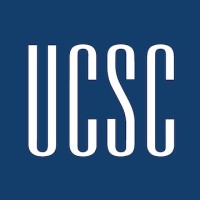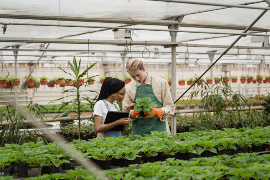Bachelor in Science in Plant Sciences (Bachelors)
UC Santa Cruz
Santa Cruz, CA
The University of California, Santa Cruz, has a strong program in the plant sciences (sometimes called botany). Resources that support the plant sciences major include state-of-the-art greenhouse facilities, natural ecosystems on the campus from coastal wetlands to redwood forests, the collections of the UC Santa Cruz Arboretum, and the Center for Agroecology and Sustainable Food Systems (including the UC Santa Cruz Farm and Garden). A hallmark of the major is the many field courses that introduce students to a diversity of terrestrial and aquatic ecosystems and the skills to conduct field research. See the Ecology & Evolutionary Biology undergraduate webpage for more information on these courses.
The plant sciences major is designed for students with an interest in plant biology and its associated curricular fields such as plant ecology and evolution, plant physiology, plant pathology, plant genetics, soils, and applied plant sciences. After completion of the core courses, students can proceed in one of several directions depending on their interests. For example, a more in-depth study of physiology and evolution courses can serve as preparation for work in biotechnology or plant breeding; further studies in plant ecology, tropical ecology, or restoration ecology can lead to careers in resource ecology and management or biodiversity exploration; upper-division training in agroecology can lead to careers in agriculture or food systems. There are many opportunities for internships both on the UC Santa Cruz campus and in the greater community.
Mga Resulta ng Pagkatuto ng Programa
The undergraduate curriculum offered by the Department of Ecology and Evolutionary Biology (EEB) is designed to ensure that all students declared in any EEB-sponsored major will achieve the following seven program learning outcomes:
✔ Students will demonstrate broad-based knowledge of the fundamentals of ecology, behavior, evolution and physiology and the relationships among these disciplines.
✔ Students will demonstrate skills in the observation and experimental study of organisms, using both field-based and laboratory-based approaches.
✔ Students will demonstrate skills in identifying, accessing, comprehending and synthesizing scientific information, including interpretation of the primary scientific literature. This includes understanding key questions and hypotheses, interpreting results and conclusions, and evaluating quality through critique.
✔ Students will demonstrate the ability to conceive and execute independent scientific research, including developing their own questions and hypotheses, designing an appropriate theoretical or empirical/experimental approach, executing that approach, and analyzing and interpreting data.
✔ Students will demonstrate an ability to understand and apply fundamental quantitative skills, including models and statistical analyses, so as to properly interpret published research and apply such skills in their own research.
✔ Students will demonstrate the ability to communicate scientific work, such as a scientific paper, proposal, essay, or notebook, in written, oral or poster format.
✔ Students will exhibit strong teamwork and problem solving skills. They will demonstrate the ability to make arguments from evidence and work together to find optimal solutions.








